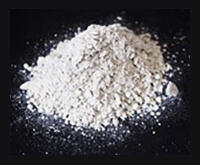Professor Kazuhiro Kubo of the Department of Home Economics Education, Faculty of Education, Gifu University, in collaboration with Biken Sangyo (Nagoya City), found that the natural zeolite produced in Toyama Prefecture improves hyperglycemia, hyperlipidemia, and obesity in obesity model mice.

Provided by Gifu University
Natural zeolites, abundant minerals in the earth's crust, are aluminosilicates with ion-exchange properties, with a fine network of structural vacancies linked through common oxygen atoms. They selectively adsorb water and exchange cations. Utilizing this functional property, zeolites are used in various applications such as ion exchangers and catalysts in various industries, soil conditioners in agriculture, water purification agents in public health, and materials in environmental conservation. However, there are no research reports on their application to the prevention of lifestyle-related diseases. According to Professor Kubo, "We believe that the functional characteristics of zeolite derived from igneous rocks (average particle size of about 100 µm), discovered in the Yao Group in Toyama Prefecture, can be expected to have an effect similar to dietary fiber, and we are conducting joint research with Biken Sangyo."
The research aimed to apply zeolites to the development of foods, with a goal of preventing lifestyle-related diseases. First, the safety of natural zeolite was examined (acute oral toxicity test), and then the effectiveness of natural zeolite for obesity and type 2 diabetes associated with high-fat feed intake was examined (long-term intake test). In an acute oral toxicity study, the minimum lethal dose of zeolite was found to be at least 2000 mg per kg of body weight in both male and female mice, confirming its high safety. In a long-term intake test (18 weeks) using a high-fat feed (30 kcal% fat), there was no difference in feed intake and energy intake in the group receiving the 10% zeolite-containing feed. However, increases in body weight, liver weight and epididymal fat (visceral fat) weight were significantly suppressed in the 10% group compared to the 0% zeolite group. Furthermore, plasma lipids (neutral lipids), total cholesterol and non-HDL cholesterol/HDL cholesterol ratios, and fasting blood glucose decreased depending on zeolite intake. In addition, in an oral glucose tolerance test (conducted at 12 weeks of the long-term ingestion test), the postprandial increase in blood glucose, after glucose administration, was inhibited in a zeolite intake-dependent manner. Insulin secretion was inhibited as well.
Since zeolite is not absorbed from the gastrointestinal tract, it is believed that it can be applied as a functional component, in a manner similar to dietary fiber. Professor Kubo said, "Zeolite is expected to have the effect of adsorbing and discharging harmful substances, so it has already been used as a feed additive for livestock. Indigestible dextrin is well known as an ingredient that suppresses the absorption of carbohydrates and lipids, but zeolite may be the second choice in the future."
This article has been translated by JST with permission from The Science News Ltd.(https://sci-news.co.jp/). Unauthorized reproduction of the article and photographs is prohibited.




